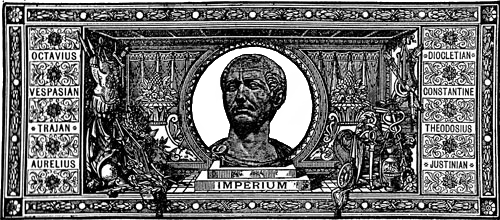Roman People > Marcus Aurelius Marius
Marcus Aurelius Marius

Background
MariusEmperor of the Gallic EmpireMarius4.jpgCoin featuring MariusReign269PredecessorPostumusSuccessorVictorinusDied269Augusta TreverorumFull nameMarcus Aurelius MariusMarcus Aurelius Marius[1] was emperor of the Gallic Empire in 269 following the assassination of Postumus.Contents [hide] 1Reign2References3Sources3.1Primary sources3.2Secondary sources4External linksReign[edit]According to later tradition, he was a blacksmith by trade, earning the nickname Mamurius Veturius, a legendary metalworker in the time of Numa.[2] He rose through the ranks of the Roman army to become an officer.[3] He was present with the army that revolted at Moguntiacum (Mainz) after the emperor Postumus refused to allow it to sack the city.[4] They murdered the emperor and in the confusion that followed, the army elected Marius to succeed Postumus.[5]His first decision was in all likelihood to allow his troops to sack the city of Moguntiacum (Mainz).[6] Seeking to solidify his power base, he then moved to Augusta Treverorum.[7] His reign lasted no more than two or three months before Postumus’ praetorian prefect Victorinus had Marius killed in the middle of 269, most likely at Augusta Treverorum [8]According to the ancient written sources, Marius’ reign lasted for two or three days only, before being killed by a sword of his own manufacture.[9] This tradition is probably partially or entirely incorrect. Based upon the number of coins he issued, a more accurate length for his reign would be at least two or three months.[10]Marius is listed among the Thirty Tyrants in the Historia Augusta. It is said that he was chosen because his names were evocative of two great Romans of the Past, Marcus Aurelius and Gaius Marius.[7]References[edit]Jump up ^ Martindale, pg. 562Jump up ^ Historia Augusta, Tyranni Triginta, 8:1; Thomas Habinek, The World of Roman Song: From Ritualized Speech to Social Order (Johns Hopkins University Press, 2005), p. 25.Jump up ^ Martindale, pg. 562; Canduci, pg. 91Jump up ^ Southern, pg. 118; Canduci, pg. 89Jump up ^ Potter, pg. 266Jump up ^ Polfer, Marius; Canduci, pg. 91^ Jump up to: a b Polfer, MariusJump up ^ Polfer, Marius; Potter, pg. 266; Canduci, pg. 91Jump up ^ Historia Augusta, Tyranni Triginta, 8:1-2; Eutropius, 9:2; Victor, Liber de Caesaribus, 33:11-12Jump up ^ Polfer, Marius; Martindale, pg. 562Sources[edit]Primary sources[edit]Aurelius Victor, Epitome de CaesaribusAurelius Victor, Liber de CaesaribusEutropius, Brevarium, Book 9Historia Augusta, Tyranni_XXX*.html The Thirty TyrantsSecondary sources[edit]Southern, Pat. The Roman Empire from Severus to Constantine, Routledge, 2001Potter, David Stone, The Roman Empire at Bay, AD 180-395, Routledge, 2004Jones, A.H.M., Martindale, J.R. The Prosopography of the Later Roman Empire, Vol. I: AD260-395, Cambridge University Press, 1971Canduci, Alexander (2010), Triumph & Tragedy: The Rise and Fall of Rome's Immortal Emperors, Pier 9, ISBN 978-1-74196-598-8Polfer, Michel, "Postumus (A.D. 269)", De Imperatoribus Romanis (1999)External links[edit] Media related to Marcus Aurelius Marius at Wikimedia CommonsRegnal titlesPreceded byPostumus and/or LaelianusEmperor of the Gallic Empire269Succeeded byVictorinusRoman Emperors
List of Emperors
Principate (27 BC – AD 235)
- Julius Caesar
- Augustus Caesar
- Tiberius
- Caligula
- Claudius
- Nero
- Galba
- Otho
- Vitellius
- Vespasian
- Titus
- Domitian
- Nerva
- Trajan
- Hadrian
- Antoninus
- Pius
- Marcus Aurelius and Lucius Verus
- Commodus
- Pertinax
- Didius Julianus
- Pescennius Niger
- Clodius Albinus
- Septimius Severus
- Caracalla with Geta
- Macrinus with Diadumenian
- Elagabalus
- Severus Alexander